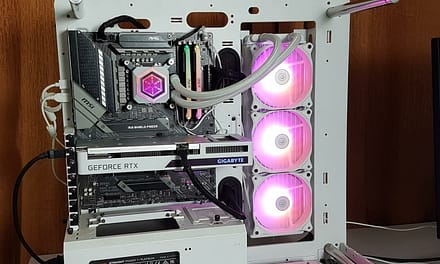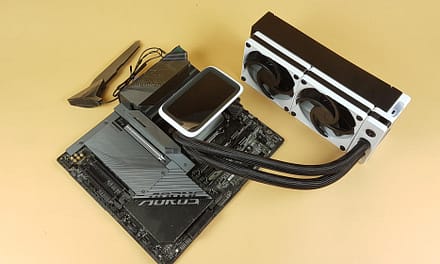Introduction
Thermal paste is of paramount consideration when it comes to the effective cooling of the main components like CPU, GPU, PCH, and any other chipset. There are multiple factors contributing towards the optimal performance of the given thermal paste over the period of time like its thermal conductance, viscosity, operating temperature range, make-up, electrically conductive, cure time, etc.
Alphacool has sent us their Subzero thermal paste for testing. The thermal conductivity of this paste is rated at 16 W/mK. It is an electrically non-conductive and high-pressure thermal compound with a viscosity of 3,000,000 mPa.s. We will compare this paste against the Noctua NT-H1.
Pricing
It is important to pay attention to the packing quantity of the thermal paste when comparing the price. Alphacool has sent us a 20gm pack which is listed at €52.98. However, this thermal paste is also available in a 1 gm pack as well which is listed at €6.99. The Noctua NT-H1 is available in a minimum of 3.5gm pack.
| Thermal Paste | Quantity | Price | Price per gm |
| Alphacool Subzero | 20gm | €52.99 | €2.64 |
| Alphacool Subzero | 1gm | €6.99 | €6.9 |
| Alphacool Subzero | 3.5gm | €12.98 | €3.70 |
| Noctua NT-H1 | 3.5gm | $10 | $2.85 |
The price of Noctua NT-H1 is taken from Amazon and the prices of Subzero various packs are taken from Aquatuning. It is clear that Subzero in 1gm pack costs more than the Noctua NT-H1. However, the 20gm pack is highly competitive against the low-quantity packs. Please keep in mind that Euro and US Dollar are almost at par at the time of writing this content.
Closer Look
Let’s start by looking at what Alphacool is saying about this thermal paste. “Alphacool’s Subzero Thermal Grease has a high thermal conductivity of 16 W/mK, making it one of the highest-performing thermal greases on the market. Only liquid metal thermal pastes offer better thermal conductivity. The Subzero Thermal Grease is delivered in an applicator with a screw cap. The amount of thermal paste is sufficient for several applications and can be stored in the applicator to protect it from drying out. A plastic spatula is included in the scope of delivery for the perfect application of the thermal paste. Subzero Thermal Grease is non-conductive and non-caustic. If a small amount of paste spills while applying, damage to the hardware is highly unlikely.”
The thermal paste is shipped inside minimal packaging. We have a transparent container with a printed paper board.
The technical data is printed over here. The thermal paste has a specific gravity of 2.7 g/cm³ and a thermal conductivity of 16 W/mK.
Alphacool has provided a tube of gray color thermal paste and there is a spatula as well for even application of the thermal paste on the heat source.
There is a black color wrapping sticker over the tube with the contact information of the Alphacool.
Specifications
Another key note is the mixture used in the Subzero. We were able to find the data on the mixture (fillers) listed in their safety data.
- Zinc Oxide 30-40%
- Aluminum Oxide 30-40%
- Aluminum Powder 20-25%
- Dimeticone 8-15%
- Boron Nitride 5-10%
The base matrix is not known. The good thing about this thermal paste is its viscosity. Due to its relatively high viscosity, this paste is expected not to bleed or disappear quickly. Alphacool has mentioned that this paste is not electrically conductive but one of the mixture is Zinc Oxide which is an electrically conductive substance. I guess, we have to take the word of the Alphacool here.
Testing
Now coming to the main point of this content, the following configuration is used for thermal performance testing: –
- GIGABYTE X670E AORUS MASTER
- AMD Ryzen 7 7700X [5.2GHz All Cores on Auto Voltage]
- Alphacool CORE OCEAN T38 360 AIO
- XPG Lancer RGB 32GB @6000MHz CL40 kit
- GIGABYTE GeForce RTX 3060 OC Rev 2.0
- Sabrent Rocket 4 Plus 2TB NVMe SSD
- bequiet! Straight Power 11 1000W Platinum PSU
- Praxis Wetbench
HWInfo64 is used to monitor the sensors.
The following testing methodology is used for the thermal paste testing:
- AMD Ryzen 7 7700X was set to run 5.2GHz on all cores using Auto VCore.
- The chip was drawing power of nearly 135W so we still have enough thermal heat output to deal with.
- A graphics card with a much higher heat load or the HEDT/EPYC CPUs with large surface areas is a better candidate for thermal paste testing.
- A blob method is used with a pea size drop in the center of IHS.
- A test run of 30 minutes was done using Cinebench R23 on stock settings.
- PC was powered off for a minimum of 30 minutes stress test run. This would allow the completion of the thermal cycle with hot and cold runs giving the thermal paste some time to reach its near-optimal condition.
- The system was on idle for 10 minutes before taking the Idle temperature values.
- A stress run of 30 minutes was made using Cinebench R23. Tdie value is used to report thermals.
- Ideally, we would have wanted to do 3 tests as a minimum for a single thermal paste and show the average of these three runs but due to my stressed health, one test result is shown.
- The fans and the pump were set to run at their full speed for which the settings were made in UEFI/BIOS.
Please note that not every run of the stress test may yield the same result. This could well be due to many factors like mounting pressure, thermal paste application and varying ambient temperature. Not to mention the silicon differences even among the same category of chips. Hence, it is pertinent to mention the testing methodology along with the specifics. Each time the even spread of the thermal paste was verified and where the thermal paste spread was not un-even or gives the impression of a tear or a poor application, the result was dropped and the new test with the correct spread was repeated. This is done to ensure the validity of the data.
Let’s take a look at the results.
Holy smoke! The Alphacool Subzero is leading all the way with a substantial difference of nearly 5°C over the Noctua NT-H1.
Conclusion
Alphacool Subzero is a high-performance thermal paste touching the level of the famous Kryonaut Extreme from Thermal Grizzly. This thermal paste is available in multiple-size packs including:
- 1gm Pack
- 5gm Pack
- 20gm Pack
Alphacool has sent the 20gm pack for testing. According to Alphacool, this thermal paste is:
- Electrically Non-Conductive
- Non-Corrosive
- Non-oxidizing
- High Pressure
- High Viscosity
- High Thermal Conductivity
This thermal paste has a thermal conductivity rating of 16W/mK making it among the few listed options in the market to touch this high rating. The strong point coupled with high thermal conductivity is the Viscosity of 3,000,000 mPa.s. These two variables make this thermal paste a good candidate for high-pressure mounting. Particularly, with this viscosity, we would expect this thermal paste to last longer without bleeding or disappearing. Alphacool did not mention the cure timing but it seems like it has minimal to no cure time. The paste has a gray color and its specific gravity is 2.7 g/cm³. The operating temperature range is -50~200°C.
The application of the thermal paste is convenient. You can use the spatula to evenly spread the paste or simply use a blob method for even spreading coming from the mounting pressure. The pricing of the thermal paste is €52.99 at the time of this writing. Calculating the 1gm price would give us €2.64 price tag which is highly competitive given the good specifications of the thermal paste. However, keep in mind that the 1gm pack of this thermal paste would cost you €6.99. Alphacool is giving a 2-year warranty on this thermal paste.
We have compared the Alphacool Subzero with the Noctua NT-H1. In our thermal testing, there is a difference of roughly 4.7°C favoring the Subzero. Alphacool means business with this thermal paste offering a competitive product with a high performance out of the box and it comes recommended by us.




















